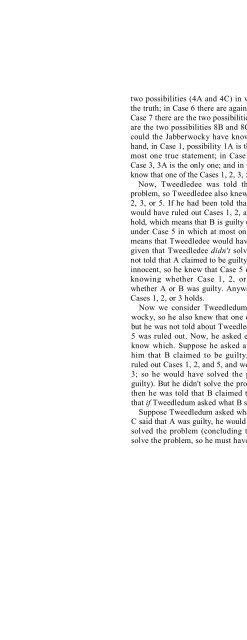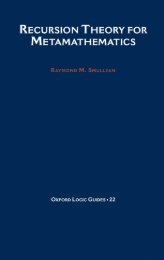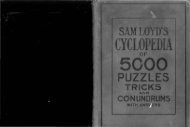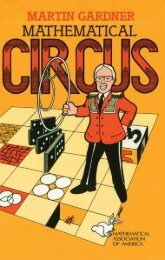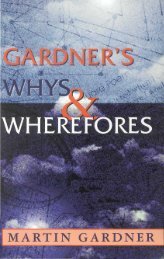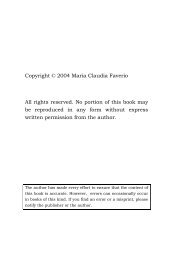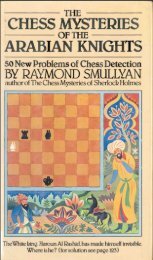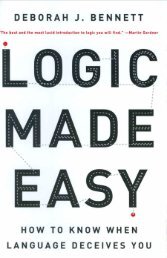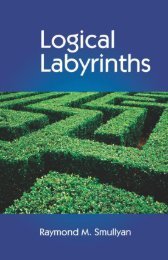Which Alice?
Which Alice?
Which Alice?
You also want an ePaper? Increase the reach of your titles
YUMPU automatically turns print PDFs into web optimized ePapers that Google loves.
Solutions to the Puzzles<br />
two possibilities (4A and 4C) in which at most one defendant told<br />
the truth; in Case 6 there are again two possibilities (6B and 6C); in<br />
Case 7 there are the two possibilities 7A and 7C; and in Case 8 there<br />
are the two possibilities 8B and 8C. So, in none of these four cases<br />
could the Jabberwocky have known who was guilty. On the other<br />
hand, in Case 1, possibility 1A is the only one in which there was at<br />
most one true statement; in Case 2, 2B is the only possibility; in<br />
Case 3, 3A is the only one; and in Case 5, 5B is the only one. So we<br />
know that one of the Cases 1, 2, 3, 5 is the one which actually holds.<br />
Now, Tweedledee was told that the Jabberwocky solved the<br />
problem, so Tweedledee also knew that the actual case was either 1,<br />
2, 3, or 5. If he had been told that A claimed to be guilty, then he<br />
would have ruled out Cases 1, 2, and 3 and known that Case 5 must<br />
hold, which means that B is guilty (because 5B is the only possibility<br />
under Case 5 in which at most one true statement was made). This<br />
means that Tweedledee would have solved the problem, but we are<br />
given that Tweedledee didn't solve the problem; therefore, he was<br />
not told that A claimed to be guilty; he was told that A claimed to be<br />
innocent, so he knew that Case 5 didn't hold, but he had no way of<br />
knowing whether Case 1, 2, or 3 held; hence he didn't know<br />
whether A or B was guilty. Anyway, we now know that one of the<br />
Cases 1, 2, or 3 holds.<br />
Now we consider Tweedledum. He was told about the Jabberwocky,<br />
so he also knew that one of the Cases 1, 2, 3, 5 must hold,<br />
but he was not told about Tweedledee; so he did not know that Case<br />
5 was ruled out. Now, he asked either about B or C, but we don't<br />
know which. Suppose he asked about B. If the White Knight told<br />
him that B claimed to be guilty, then Tweedledum would have<br />
ruled out Cases 1, 2, and 5, and would have been left just with Case<br />
3; so he would have solved the problem (concluding that A was<br />
guilty). But he didn't solve the problem; so if he asked what B said,<br />
then he was told that B claimed to be innocent. So we now know<br />
that if Tweedledum asked what B said, then Case 1 or Case 2 holds.<br />
Suppose Tweedledum asked what C said. If he had been told that<br />
C said that A was guilty, he would have eliminated Cases 1, 3, 5 and<br />
solved the problem (concluding that B was guilty). But he didn't<br />
solve the problem, so he must have been told that C claimed that A<br />
181


